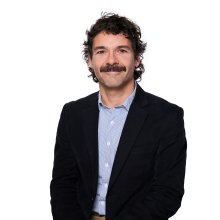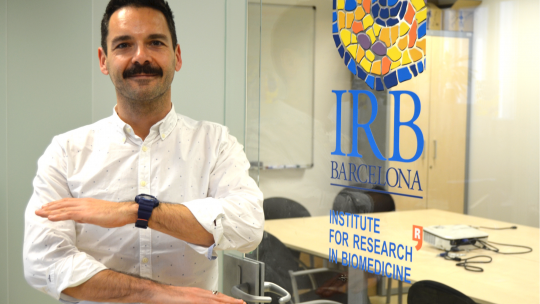Images
Participants

Contact

Tiago Botelho (Lisboa, 1979) joined IRB Barcelona in 2013 as Industry Liaison Officer, a position responsible for liaising with companies.
He also collaborates with the IRB Barcelona Equality and Diversity Committee and is involved in the European project CALIPER, which started in January 2020. Tiago loves music and enjoys travelling and discovering new places (on land and underwater). He is also an amateur snowboarder.
In September 2019, Tiago became president of PRISMA, an association for affective-sexual and gender diversity in Science, Technology and Innovation that was created in April 2019 to avoid discrimination and improve the visibility of Lesbians, Gays, Trans*, Bisexuals, Intersexuals, Queers, Asexuals and other identities (LGTBIQA+), which fall outside the cis-heterosexual norm, in these fields of knowledge. PRISMA is a feminist and anti-racist association with a vocation to include an intersectional perspective in all its practices. Tiago joined PRISMA to contribute to improving the situation of this diverse group, to collaborate with refugee support programs, and to disarm pseudoscientific arguments used against diversity.
"Diversity makes us stronger. Representation of the LGTBIQA+ perspective among people who are dedicated to research is essential".
How do you fight against the prejudices that surround the issue of affective-sexual and gender diversity, particularly in the field of science and technology?
At PRISMA, we have several lines of action: some more transversal to the LGTBIQA+ community (and which we try to focus on in our fields of work) and others that result directly from our knowledge in the scientific area. Regarding the former, we promote the visibility of our group and the approach and participation of LGTBIQA+ people in the fields of science, technology and innovation (STI) and we generate good practices that foster more inclusive and diverse study and workspaces in STI. Concerning the second group of actions, I would like to underline that we promote a less biased and broader perspective regarding diversity in STI practices and methodologies and, of course, we study and combat pseudoscientific discourses with objective data and scientific evidence. An example of this research is the white paper that we are working on regarding the relationship between the concepts of "sex" and "gender" and their relevance to the ongoing debate on Gender Self-Determination.
What do you think are the main causes of under-representation of LGTBIQA+ people in science and technology?
According to some studies published in recent years on STEM (Science, Techonology, Engineering and Mathematics), personnel in the US (for example, Yoder et al. 2015), almost half of LGTBIQA+ people are still, at least partially, in the closet Even when there is no direct hostility or discrimination, the heteronormativity that prevails in these workplaces prevents the free expression of these people, thus favouring their isolation and hindering their professional careers. These numbers are even higher within the Trans collective. This means that there are fewer references and therefore less openness. And this is how the cycle develops. PRISMA is working with the Spanish Ministry of Science and Innovation on a survey to assess the current situation at the national level (there are some surveys done at the local level, but not at the national level).
An increasing number of research centres implement equality and diversity policies to fight discrimination. Do you think things are moving at the right speed? What progress would you highlight?
Here I would like to highlight that things are moving in the right direction…things are moving forward, but slowly. We believe that there is a general willingness, and more inclusive and non-discrimination policies are being developed. They still need to be complemented with action protocols when situations of discrimination are detected. We would like the implementation of these positive actions to be faster but we understand that this change in mindset does not happen overnight.
For example, at PRISMA, we have developed a series of measures to prevent discrimination in research centres. We will be presenting these measures shortly in collaboration with the Ministry of Science and Innovation, and we are working with them to ensure that these measures are applied in research centres charteredby the Ministry. There are actions as simple as changing the registration forms (almost the first thing you fill in when you get a new job), so that they stop using the binary options “man/woman” and instead refer to “man/ woman/ I don’t identify myself as any of the above/ Prefer not to say”. This change, for example, would help non-binary people feel more integrated. We are also trying to ensure that some of these measures for research centres are included in the new LGBTI Equality Law.
Furthermore, there is already an awareness that diversity is important to avoid bias when sampling for a scientific study . As reflected by our motto at PRISMA, "diversity makes us stronger" - this is also applicable to research. Representation of the LGTBIQA+ perspective among people who are dedicated to research is essential. If all the researchers are cis-heterosexual men, they will tend to think that the results obtained from a set of cis-heterosexual men like them can be extrapolated to the rest of the population, and this is not the case.
In the specific case of IRB Barcelona, what are the initiatives or measures that you know of that have been taken regarding integration and non-discrimination? What would you change or improve?
I think the most significant aspect isthe awareness that the LGTBIQA+ community also exists in the field of biomedical research and that there is a need to give it more visibility and participation, since gender diversity offers a highly advantageous and enriching comprehensive vision. The IRB Barcelona Equality and Diversity Committee is working on measures to ensure that gender equality is not simply binary, and PRISMA offers them help and advice in this endeavour. Indeed, during 2020, the institute plans to hold a round table addressing this topic from different angles and also intends to draft measures to promote the inclusion and professional development of the LGTBIQA+ collective at IRB Barcelona.
About IRB Barcelona
The Institute for Research in Biomedicine (IRB Barcelona) pursues a society free of disease. To this end, it conducts multidisciplinary research of excellence to cure cancer and other diseases linked to ageing. It establishes technology transfer agreements with the pharmaceutical industry and major hospitals to bring research results closer to society, and organises a range of science outreach activities to engage the public in an open dialogue. IRB Barcelona is an international centre that hosts 400 researchers and more than 30 nationalities. Recognised as a Severo Ochoa Centre of Excellence since 2011, IRB Barcelona is a CERCA centre and member of the Barcelona Institute of Science and Technology (BIST).

